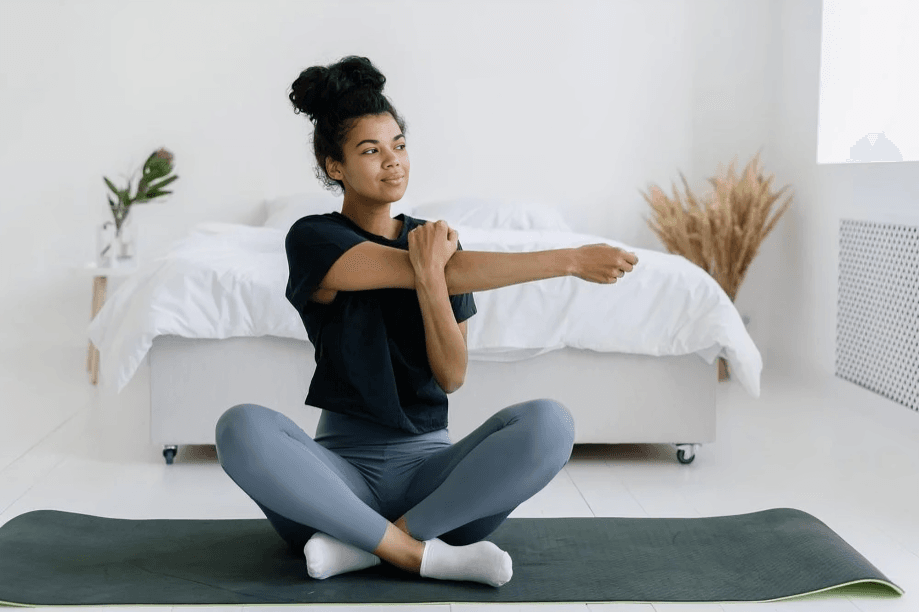
“
Overcoming sleep disorders naturally is possible with the right approach. Natural sleep solutions focus on improving sleep quality without relying on medications. These methods are safe, effective, and offer long-term benefits for better sleep and health.1
1
”
A regular sleep schedule helps reset your internal clock. Going to bed and waking up at the same time daily trains your body to fall asleep and stay asleep more easily. 1
Avoid caffeine and nicotine several hours before bed. These substances are stimulants, interfering with your ability to fall asleep. Opt for herbal teas like chamomile to promote relaxation and sleep. 2

Create a calming bedtime routine. Activities like reading, meditating, or taking a warm bath can signal to your brain that it's time to wind down, aiding the transition to sleep.
Limit screen time at least 30 minutes before bed. The blue light emitted from phones, tablets, and computers disrupts melatonin production, making it harder to fall asleep naturally. 3
Mind your diet. Eating heavy meals or drinking large amounts of fluids before bedtime can disrupt sleep. Instead, opt for light snacks like a banana or a handful of nuts if you're hungry. 4
Practice relaxation techniques like deep breathing, progressive muscle relaxation, or guided imagery. These can help lower stress levels and ease tension, making it easier for you to fall asleep. 5
Get exposure to natural sunlight during the day. Sunlight helps regulate your circadian rhythm, making it easier to fall asleep at night and wake up feeling refreshed in the morning. 6
Reduce stress and anxiety by journaling or talking to someone you trust. Emotional turmoil can contribute to insomnia, so expressing your thoughts can relieve mental clutter before bed. 7

Limit naps during the day. Long naps or napping too late in the afternoon can interfere with your nighttime sleep. If you must nap, keep it under 30 minutes.
Try aromatherapy to promote relaxation. Essential oils like lavender, chamomile, and sandalwood have been shown to improve sleep quality by reducing anxiety and creating a peaceful environment. 8
Ensure your bedroom is free from distractions. A clutter-free, peaceful space can signal your brain to rest. Try minimizing noise and light sources, using blackout curtains if necessary. 9
Practice mindfulness meditation before bed. Mindfulness helps quiet the mind and reduces overthinking, which can keep you awake at night. Focus on your breath and bring awareness to the present moment. 10
Use white noise or calming sounds to mask disturbing noises in your environment. A fan, white noise machine, or relaxing nature sounds can help create a soothing auditory environment for sleep. 11
Herbal supplements like valerian root or passionflower may help promote relaxation and improve sleep quality. Consult with a healthcare provider to ensure they are safe for your specific situation. 12
Avoid stimulating activities before bed, such as working or watching intense TV shows. Engaging in these activities can increase heart rate and mental stimulation, making it harder to fall asleep. 13

Practice yoga or gentle stretching before bed. These activities can help reduce muscle tension and promote relaxation, making it easier to transition into a restful state before sleep.
Maintain a comfortable temperature in your bedroom. A room that is too hot or cold can disrupt sleep. Aim for a cool environment, ideally between 60-67°F (15-20°C) for optimal sleep. 14
Ensure your bedroom is dark and free from electronic light. Use blackout curtains and dim lighting in the evening to signal to your body that it’s time to wind down for sleep. 15
Stay hydrated throughout the day, but avoid excessive liquids before bed. This prevents waking up in the middle of the night to use the bathroom, helping you sleep more soundly through the night. 16
Limit the use of sleep medications. Relying on pills can lead to dependence and worsen sleep problems in the long run. Instead, focus on natural methods to improve sleep quality over time. 17


